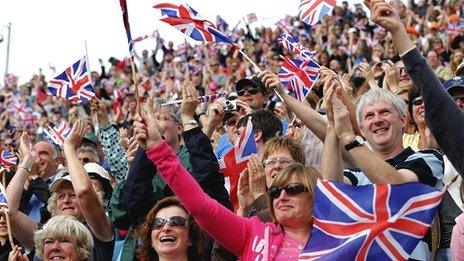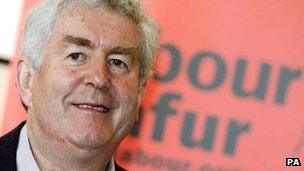Does it pay for politicians to be patriotic?
- Published

Olympics success unleashed patriotic pride in Team GB
The Olympics and the Queen's Diamond Jubilee have made 2012 the year of the Union flag.
When was the red, white and blue last waved with such abundant and obvious pride as it was during Britain's golden summer of sport?
So perhaps it's the appropriate time to ask if it pays political parties to be patriotic.
In the opinion of one Welsh Labour MP, patriotism has done his party no harm.
Shadow Welsh secretary Owen Smith says fusing Welsh identity and progressive politics has helped keep Labour in power in Cardiff Bay since the outset of devolution.
'National mission'
The act of creating devolution itself was a response to a renaissance of popular Welshness, he says.
In an essay, external, the Pontypridd MP urges Labour to do something similar in the rest of the UK by making itself a vehicle for British national pride and identity.
He writes: "It is this fusion of progressive politics with a national mission - this capture of patriotism from the right - that Labour needs to understand and adopt across the UK if we are to return to power and to shape the future of Wales and the other nations of the British state over the next 25 years."
If Labour successfully rode a tide of Welsh patriotism, why not do the same across the UK?
Mr Smith proposes policies to "create a new spirit and rhetoric of fraternity and national solidarity" - a national care service, a national day or a US-style state of the British union address.
"It might also provide a framework within which we could more easily recognise the gross inequality of wealth, education, opportunity and even life expectancy that persist in Britain, and enlist a majority in favour of their eradication," he writes.
Perhaps the key word in his essay, published in a book marking the 25th anniversary of the Institute of Welsh Affairs think tank, is "authenticity".
Put another way, voters won't give you the time of day if they can't take you for real.
Mr Smith senses that the crowding of the centre ground in British politics has damaged his party's appeal. Meanwhile, Welsh Labour succeeded by staying true to its radical heritage.
'Community-driven'
But conversely, the New Labour project helped the Welsh Labour brand. Perhaps the easiest way to define Welsh Labour is to say it's not New Labour.
When Rhodri Morgan ran for the Welsh Labour leadership it was clear he was not Tony Blair's man, unlike his opponent Alun Michael.
Mr Morgan and his successor Carwyn Jones have their own way of running public services. Mr Smith calls it "collectivist community-driven". Mr Morgan preferred to call it "clear red water".

Rhodri Morgan aimed to establish "clear red water" between Welsh Labour and New Labour
It's a slogan that suggested voting Labour was the patriotic thing to do.
And it helped deliver half the assembly's 60 seats at the 2003 election - a high-water mark that Labour has achieved only twice in four Senedd elections since 1999.
But Labour isn't the only party to see electoral value in shrouding itself in the red dragon.
Welsh Conservatives, for example, were desperate for a Welsh MP to be appointed Welsh Secretary in David Cameron's recent reshuffle.
They spoke highly of Cheryl Gillan, but her home counties constituency was becoming a problem for Welsh Tories.
Welsh Liberal Democrat leader Kirsty Williams wastes no opportunity to remind us she will stand up to Nick Clegg and co when it's in the interests of Wales.
But elections for the assembly are more than a competition to see who is the most Welsh.
If they were, surely Plaid Cymru - the self-styled party of Wales - wouldn't have endured such a poor result at last year's assembly election.
Identifying a policy as Welsh or British doesn't necessarily mean voters will agree that it's right for Wales or right for Britain.
Perhaps the lesson is that getting our patriotic juices flowing is best left to sports stars, not politicians.
- Published4 September 2012